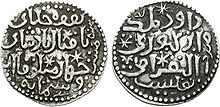- David VII of Georgia
-
David VII
დავით VIIKing of Kings of Georgia 
The legend citing "Struck by the Georgian King David in the name of his overlord Möngke Khan by the power of Heaven” in Persian. (Dated 1253) King of Georgia Reign 1247–1270 Coronation 1245 at Svetitskhoveli Cathedral Predecessor David VI Successor Demetre II Spouse Jigda Khanum Mkhargdzéli
Althun
Gvantsa Kakhaberidze
IsukhanIssue George
Tamar
Demetre IIFull name David VII the Elder
Davit VII UluDynasty Bagrationi Father George IV of Georgia Born 1215 Died 1270
TbilisiBurial Svetitskhoveli Cathedral, Mtskheta Religion Georgian Orthodox Church David VII Ulu (1215–1270), from the Bagrationi dynasty, was king of Georgia in 1247–1270. He reigned over the eastern part of the country from 1259 to 1270.
Contents
Life
David was an illegitimate son of King Giorgi IV Lasha by a non-noble woman. Fearing that he would pretend to the throne, his aunt, Queen Rusudan held him prisoner at the court of her son-in-law, the sultan Kaykhusraw II for nearly seven years, and sent her son David to the Mongol court to get his official recognition as heir apparent. Following Kaykhusraw’s defeat by the Mongols, David, son of Giorgi, was set free in 1242. In 1246, he was selected as king by the Georgian nobles who believed that his cousin David VI, son of Rusudan, had died in 1244. Following the coronation at Svetitskhoveli Cathedral, Mtskheta, he was sent to the Great Khan Güyük Khan to receive an official recognition. Held at Karakorum for five years, he met his cousin David there. Finally, Güyük Khan recognized David (Lasha Giorgi’s son) as senior joint sovereign and appointed another David (Rusudan’s son) junior co-ruler. Thereafter known as David VII Ulu (i.e. "the senior") and David VI Narin (i.e. "the junior"), the cousins ruled jointly for years.
In 1256, David Ulu with the Georgian auxiliaries took part in Mongol conquest of Alamut. In 1259, David Narin rose, unsuccessfully, against the Mongol yoke and, then, fled to Kutaisi, from whence he reigned over western Georgia (Imereti) as an independent ruler. In 1260, Hulagu Khan requested that David Ulu supported him in the war against Egypt. David, remembering the Georgian losses at Baghdad (1258) refused to comply and revolted. A huge army of Mongols led by Arghun Noyan attacked the southern Georgian province of Samtskhe, defeated the king and his spasalar (general) Sargis Jakeli of Samtskhe, but could not capture the rebels’ main strongholds and left the country in June 1261. Nevertheless, the forces were unequal and David Ulu had to take refuge at his cousin, David VI Narin’s court at Kutaisi. His family was captured and David’s wife Gvantsa killed by the Mongols. In 1262, he had to make peace with the Mongols and returned to Tbilisi, eastern Georgia. Thus, Georgia effectively split into two parts. However, both rulers continued to be titled as kings of Georgia.
By the Ilkhan request, David Ulu’s army was dispatched to defend the fortifications of Siba against the Golden Horde in 1263. In 1265, the Georgian forces serving as a vanguard of the Ilkhan army, defeated Berke, Khan of the Golden Horde, and expelled his troops from Shirvan. A heavy burden of Mongol dominance led to a political and economic crisis in the kingdom. As a result of a dispute with the royal court, the province of Samtskhe seceded and submitted directly to the Ilkhan rule in 1266. Thus, Georgia further disintegrated to form three separate political entities.
David VII Ulu died of a bowel infection at the age of 55 in the spring of 1270. He was buried at Mtskheta.
He was succeeded by his son Demetre II.
Marriage and children
He was married four times. His first wife, Jigda Khanum, daughter of the Sultan of Rüm, died in 1252. During his second marriage he bigamously contracted an union with Althun, 1249/50, who repudiated in 1252. David's third wife Gvantsa, widow of the Georgian noble Avag Mkhargrdzeli and daughter of Kakhaber, eristavi (duke) of Racha and Tavkveri, was executed on the orders of Hulagu Khan in 1262. In 1268, David married Isukhan, daughter of the Mongol prince Tehormaghan Noyan.
He had two sons and two daughters, including:
- Prince Giorgi (1250–1268) (by Jigda Khanum), heir apparent, died before his father’s death in 1268,
- Prince Demetre (by Gvantsa) succeeded him in 1270,
- Princess Tamar (by Jigda Khanum) was married twice: a Mongol prince, son of Arghun Khan, and later the Georgian noble Sadun of Mankaberdi, regent of the kingdom in 1269-1278.
A genealogical theory also considers him father to Rusudan of Georgia, wife of Manuel I of Trebizond.[1]
References
External links
Preceded by:
RusudanKing of Georgia with David VI Narin
Succeeded by:
Demetre IICategories:- Monarchs of Georgia (country)
- Kings of Georgia (country)
- 1215 births
- 1270 deaths
- Orthodox monarchs
Wikimedia Foundation. 2010.
